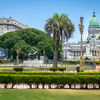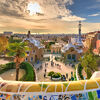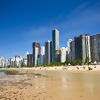26 Nights | ATLANTIC TAPESTRY
You will visit the following 15 places:

Buenos Aires F.D.
One of South America‘s booming capitals and major cities, Buenos Aires is a seductive and cultured city with an eclectic mix of people and places. Elegant yet always bustling, Buenos Aires also encapsulates the very essence of Argentina. The city is known for its European atmosphere, passionate tango and vibrant nightlife.

Tenerife

Montevideo
Montevideo is the largest city, the capital, and the chief port of Uruguay. The settlement was established in 1726 by Bruno Mauricio de Zabala, as a strategic move amidst a Spanish-Portuguese dispute over the platine region, and as a counter to the Portuguese colony at Colonia del Sacramento. According to the census of 2004, Montevideo has a population of 1,325,968. It has an area of 200 square miles and extends 12 miles from west to east. The southernmost cosmopolitan capital city in the Americas and third most southern in the world, it is situated in the southern coast of the country, on the northeastern bank of the Río de la Plata. The city was under brief British rule in 1807 and was involved in the first major naval battle in the Second World War: the Battle of the River Plate.

Barcelona
Barcelona – Spain's enchanting capital, second largest and most populous city. It is a huge city that vibrates with life, and there’s certainly not another city in the country to touch it for its sheer style, looks or energy. It is one of the world's leading tourist, economic, trade fair and cultural centers, and its influence in commerce, education, entertainment, media, fashion, science, and the arts all contribute to its status as one of the world's major global cities. Barcelona is home to masterpieces of many great architects – the most famous of which is Antoni Gaudí.

Recife
Recife, the capital of Pernambuco, is one of the largest and most important cities on the northeastern coast of Brazil. Known for its large scale production of sugar cane, its name is an allusion to the stone reefs that are present by the city's shores. The many rivers, small islands and over 50 bridges found in Recife city centre characterise its geography and led to the city being called the "Brazilian Venice." Recife stands out as a major tourist attraction of the Northeast, both for its beaches and for its historic sites, dating back to both the Portuguese and the Dutch colonization of the region. The beach of Porto de Galinhas, 60 kilometers (37 mi) south of the city, has been repeatedly awarded the title of best beach in Brazil and has drawn many tourists. The Historic Centre of Olinda, 7 kilometers (4.3 mi) north of the city, was declared a UNESCO World Heritage site in 1982, and both cities' Brazilian Carnival are among the world's most famous.

Rio de Janeiro
Rio de Janeiro or just simply Rio, is one of the most visited cities in the Southern Hemisphere and is known for its natural settings, Carnival, samba, bossa nova and balneario beaches such as Barra da Tijuca, Copacabana, Ipanema and Leblon. The city has a remarkable architectural heritage, some of the country’s best museums and galleries, superb restaurants and a vibrant nightlife. With so much to see and do, Rio can easily occupy a week and you may well find it difficult to drag yourself away. As Rio achieved independence from the Portuguese rulers, the city expanded politically, culturally, economically and architecturally.

Rio Grande

Punta del Este
Punta del Este is a city and resort on the Atlantic Coast in the Maldonado Department of southeastern Uruguay. Although the city has a year-round population of about 9,280, municipality to which the city belongs. It includes Punta del Este proper and Península areas. It is a beach resort town complete with casinos, beaches, yachts and lots of tourists. Many of these tourists come from the other side of the Rio de la Plata from Argentina to get some nice fun in the sun on a beach away from the brown waters of the Rio de la Plata.

Santos

Paraty

Ilha Grande

Búzios

S Sebastian

Porto Belo










